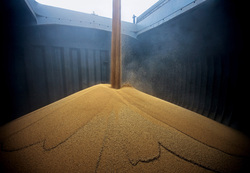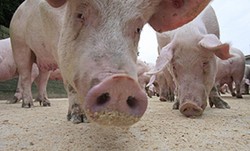
“Whatever Chinese consume more of, need more supply of from outside, this is our area,” Cofco charmain Frank Ning said, whether that means engaging in farming, logistics, processing or trading ventures in supplier countries.
Cofco seeks acquisitions to ‘balance’ China’s food demand
By Bloomberg News
Oct. 21 (Bloomberg) -- Cofco Ltd., China’s largest grains trader, said it is seeking overseas acquisitions to help secure supplies of commodities including soybeans, wheat and sugar as rising domestic incomes spur faster food demand growth.
The state-owned company is looking for investments in the U.S., South America, Australia and Russia, Frank Ning, company chairman, said in an interview in Beijing. He did not identify which companies were being considered.
“I’m trying to connect the Chinese consumer market with outside sources,” Ning said yesterday. “Whatever Chinese consume more of, need more supply of from outside, this is our area,” he said. The company may be engaged in farming, logistics, processing, and trading ventures in supplier countries, Ning said.
Securing external food supplies is becoming increasingly important after urban household incomes in China more than tripled in the past decade, fueling consumption of meat, poultry and dairy. China, which last year became a net corn importer for the first time in more than 10 years, may have bought as much as 3.5 million metric tons in the first half, researcher Grain.gov.cn said on Oct. 13.
China may have to increase imports because its dependence on the use of ground water for grain production “isn’t going to be sustainable indefinitely,” said Arthur Kroeber, managing director of Beijing-based GaveKal Dragonomics Research, a financial advisory firm.

China, now a net corn importer, may have bought as much as 3.5 million metric tons in the first half of the year and may import up to 20 million a year by 2015.
Corn imports may surge to as much as 20 million tons a year by 2015 while rice imports may total 8 million tons, Chief Executive Officer Sunny Verghese of Olam International Ltd. said Oct. 18.
“Today China will have to look at global sources to balance its demand,” Ning said. Corn has become particularly “tight” because of its wider application outside the livestock industry, such as paper-making and pharmaceutical use, Ning said.
China may be putting off “inevitable” large grain imports for 10 to 20 years to enable the opportunity to “develop companies like Cofco as domestic alternatives to Cargill and give them some sense of security of supply,” Kroeber said.
While the government has limited expansion of corn-based industry to ensure priority for livestock, “it’s difficult to control demand for starch” or other corn-derived products because there’s a strong demand for them, he said. So “either we produce here, or buy from outside,” he said.
China has become more transparent in the past five years by disclosing grain reserves and by signaling it wants to boost corn and pork imports, Ning said.
Wheat, Rice
Still, the world’s biggest grain grower will likely remain mostly self-sufficient in wheat and rice, Ning said. China’s 1.3 billion people consume 160 million tons of rice a year, so no country can “supply the gap if China produces a gap,” he said. The biggest exporter Thailand only exports 8 million tons, he said.
Cofco is looking into wheat-related projects in Russia, Ning said without elaborating. After winning control of Australian sugar mill Tully Sugar Ltd., Cofco is seeking to acquire Proserpine Co-operative Sugar Milling Association. Proserpine rejected a revised offer on Sept. 24, saying “it leaves a lot of unanswered questions.”
The company’s expansion into other countries may encounter difficulties, Ning said. “It’s in a different country with different people” with nationalism or “other things,” he said. The difficulties likely stem from a “lack of understanding of what the Chinese may do,” Ning said. “The Chinese want to do business, that’s all,” he said.

Most countries will find it a rather “sensitive matter” to either sell or give long-term leases for food production areas to other foreign entities, Kroeber said. Still, cash-rich Cofco can offer “very attractive terms,” he said.
Most countries will find it a rather “sensitive matter” to either sell or give long-term leases for food production areas to other foreign entities, Kroeber said. Still, cash-rich Cofco can offer “very attractive terms,” he said.
The demand for food in China will keep expanding because the economy will continue its fast growth, given the urbanization of millions of farmers, the rising middle-class and continued overseas investments, Ning said. “I don’t think China will have a hard-landing,” he said.
--William Bi. Editors: Richard Dobson, Ovais Subhani
To contact Bloomberg News staff for this story: William Bi in Beijing at [email protected]
To contact the editor responsible for this story: Richard Dobson at [email protected]













